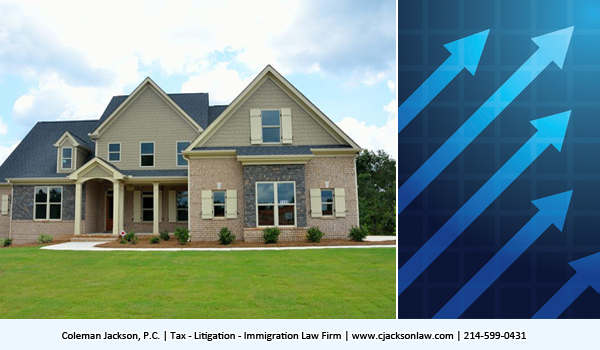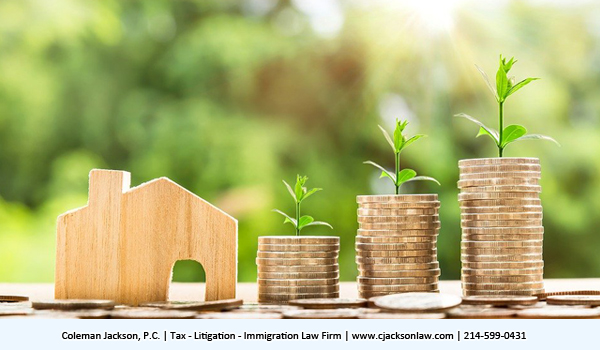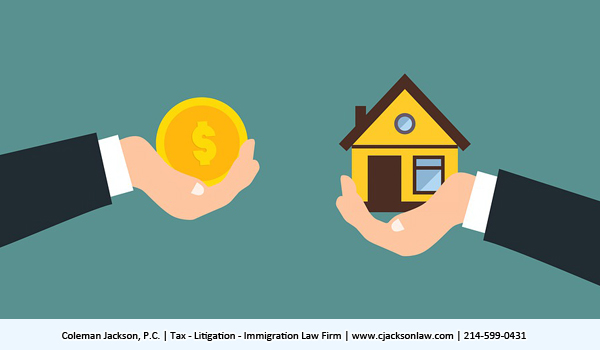Gains from Sale Or Exchange of a Residence are Sometimes Taxable
By: Coleman Jackson, Attorney & Certified Public Accountant
June 12, 2022

The residential real estate market has been hotter than a Texas Summer for more than three years now. Principal residences have been flying off the shelf for just as long throughout Texas and practically everywhere else in the United States. First time home buyers, others and investors too have been bidding up the prices; seemly, with no end in sight to higher and higher prices. I heard recently that the pace of home sales in the North Texas area has begun to slow a bit; but the prices have not modulated that much. Prices are up; and residential residence sellers are still in the power seat; some continue to flip their homes like flipping pancakes on a hot griddle. Lots of money is being made by home owners. What does the federal tax laws have to say about gains from sale or exchange of principal residences?
Gain Exclusion for Single Taxpayer Filers:
Internal Revenue Code Sec. 121(b)(1) provides for exclusion from gross income for federal tax purposes up to $250,000 of gain from the sale or exchange of property if, during the 5-year period ending on the date of the sale or exchange, the property was owned and used by the taxpayer as the taxpayer’s principal residence for periods aggregating 2 years or more.
Gain Exclusion for Husbands and Wives Filing Joint Tax Returns:
Internal Revenue Code Sec. 121(b)(2) provides for exclusion from gross income for federal tax purposes up to $500,000 of gain from the sale or exchange of property if, during the 5-year period ending on the date of the sale or exchange, if
- Either spouse owned the property during the 5-year period ending on the date of the sale or exchange and either spouse used the property as their principal residence for periods aggregating 2 years or more;
- Both spouses meet the 2-year use requirement; and
- Neither spouse is ineligible for the principal residence gain exclusion because one or both of them were involved in the sale or exchange of prior principal residence during the 2-year period ending on the date of the current sale or exchange.
Some Special Rules or Applications in Various Different Situations:
Physical or Mental Incapacity:
Taxpayers can become ill and incapacitated and spend long stresses of time in nursing homes or other long-term care facilities. If such unfortunate events, such as, physical or mental incapacity occur, the taxpayers qualify for the exclusion of gain on the sale of their principal residence, so long as, they own the property for a five-year period and reside in the property as their principal residence for a period aggregating 12 months
Ill Health, Change of Employment Unforeseen Circumstances:
In the event the5-year principal residence ownership period or the 2-year principal residence use period are not met due to ill health, change of employment or otherwise unforeseen circumstances. The burden rest on the taxpayer to marshal the facts and evidence to show that they qualify for this exception to the 5-year ownership requirement and the 2-year principal residence use requirement of the statute.
Survival and Divorce Situations:
The 5-year property ownership and 2-year principal residence use period includes the 5-year property ownership and 2-year use period the survival’s deceased spouse held the property for purposes of exclusion of the gain on sale of principal residence. Property used by a former spouse pursuant to a divorce decree or marital separation agreement counts towards the individual’s 2-year use of the property as a principal residence for the purposes of exclusion of gain on sale or exchange of a principal residence.
Uniformed Services, Foreign Service, and Intelligence Community:
Uniformed service members, United States foreign service employee and employees of the U.S. intelligence community can elect to extend the 5-year ownership period for up to 10 years and suspend the 2-year use period while they or their spouse is serving the U.S. in their official capacities as a member of the U.S. uniformed services, or U.S. foreign service or employee of the U.S. intelligence community.
Expatriation to Avoid Tax (Former Citizens of the United States):
Internal Revenue Code Sec. 877 provides that gain on the sale or exchange of property by an expat is included in their gross income for federal tax purposes. The exclusion rules of Internal Revenue Code Sec. 121(a) are not applicable to expats.
With respect to the high real estate prices and rapid flipping of residential real estate now-a- days, the tax issue is this one: how many homeowners selling their residences will have recognized gains for federal tax purposes? If none of the special situations and rules discussed above apply, these gains from sale of residential property could be taxable at the taxpayer’s ordinary tax rates.
This law blog is written by the Taxation | Litigation | Immigration Law Firm of Coleman Jackson, P.C. for educational purposes; it does not create an attorney-client relationship between this law firm and its reader. You should consult with legal counsel in your geographical area with respect to any legal issues impacting you, your family or business.
Coleman Jackson, P.C. | Taxation, Litigation, Immigration Law Firm | English (214) 599-0431 | Spanish (214) 599-0432 | Portuguese (214) 272-3100



